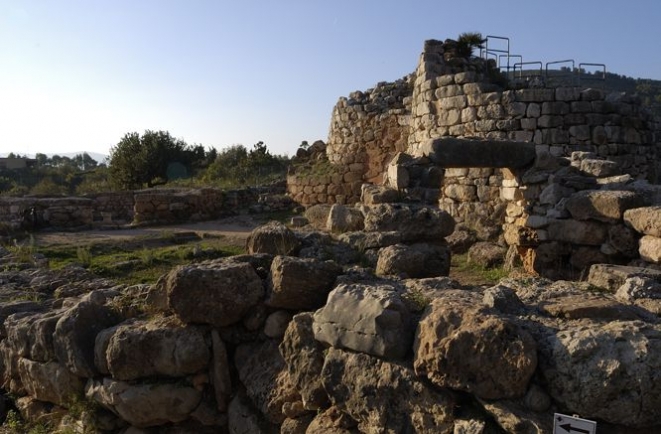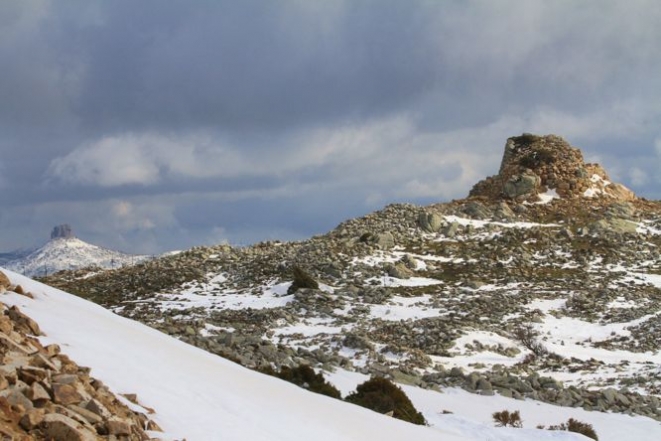Sardinia-Atlantis? Sardinia Island of the Blessed?
The pillars contention
Among the many anecdotes that tell about the birth of Sardinia Island, there is the one that tells about a large island, Tyrrhenis. A beautiful island, with a lush vegetation, inhabited by people and animals by a beautiful appearance. One day God's wrath awoke suddenly on the island, which was raged by high waves caused by the fury of an earthquake. The waters invaded much of the plains up to the hills. However God felt regret at seeing dispersed such beauty and he held the foot with a small portion of land that had not yet been submerged by the waves. Thus was born Ichnusa (footprint in ancient Greek), by the vestiges of a continent that millennia ago was ravaged by a cataclysm that had engulfed most of its surface.
This story fits easily with the History of Atlantis told by Plato (who lived between 427 and 347 BC.). A beautiful land located outside the Pillars Of Hercules that was swallowed by the sea about nine thousand years before the time when he was speaking, because of the wrath of Zeus, outraged by the behavior despicable and devoid of morality that the inhabitants, first sober, had assumed. The island disappeared swallowed by the deep sea due to a cataclysm.
Plato argued that then existed a large island, very powerful politically and militarily, rich and prosperous. This place was located beyond the Pillars of Hercules and commanded the peoples of North Africa, Libya, and those within and beyond the Pillars of Hercules.
It would certainly be pretentious to equip what is the result of a scientific hypothesis. However, from an assumption, a fanciful tale can arise quite as it may, likewise, have originated a scientific thesis. There are different and opposite fates that may suggest a good idea.

If we consider implausible that the Platonic Pillars of Hercules were the Strait of Gibraltar, if we consider the fact that today the supporters of the thesis that sees Atlantis outside of Gibraltar, in the Atlantic Sea, had to resign that the searches have never retrieved no one trace of a submerged continent, if the reality and the legend can sometimes happily coexist, could Sardinia be Atlantis?
It would not be a hypothesis to be rejected a priori if we move the Pillars of Hercules between Libya and Agrigento, so that all geographical errors of the ancient Greeks would leaf.
The pieces of the puzzle may coincide where Eratosthenes (284 -197 BC.) had not put the boundaries of the world in Gibraltar, so that Greece could be considered the center of the known world in the absence of a true comparison chart. So before the possibility of a false history, Atlantis Island, described as a pleasantly mild climate land, rich in metals and dotted with towers (supposedly our nuraghes), necessarily correspond to Sardinia.
The match will be if, considering that Plato instead of meant nine thousand years, he wanted to talk about months, as the measurement of time in months was most used in the past; then, in this way, nine thousand months would become seven hundred and fifty years which, added to three hundred ninety-nine, as Socrates told Plato's mythical continent, presumably died in 399 BC., is obtained in 1150 BC., the heyday of the Shardana civilization, the Sea People, that expanded its supremacy over other populations, including the Egyptians.

It was perhaps Sardinia the Island of the Blessed, one of those mythical islands where the gods made heroes to spend a happy existence? The Island of the Blessed was in a region where there were no rain or snowing, dominated by the zephyr wind blowing, the Mistral, where there were temples dedicated to all the gods, with monolithic altars in order to make sacrifices to them.
The writer Luciano (125- 180 AD) wrote about a period of the year when, in the Island of the Blessed, were held sacred games which have many similarities with the Sardinian festivals; placed in front of the island another one on which there is a burning fire (perhaps the Etna volcano?) that was in front of the Italian regions bordering on Greece.
If we consider all these clues that lead towards an only solution: the importance, the absolute centrality and supremacy that the Sardinian people has had against other populations in the past. The face of history would completely change appearance.
As enchanted by a spell that has made us forget our origins, little by little we will wake up from a lethargy deliberately imposed by history and very likely we will discover what we have before our eyes that, despite everything, Sardinia is really the mythical Island of the Blessed.